|
De Argentijnse dichter Juan Gelman werd geboren op 3 mei 1930 in Buenos Aires. Zie ook alle tags voor Juan Gelman op dit blog.
SAINT THERESA
and with many birds and their songs in the /
highest part of the mind or head / and rumblings
in it like the sea / or laments /
or winds or movements / suns
that clash / go out / then burn again / or powers
like thousands of animals that track
up the suburbs of the soul / suffering
terrible ordeals i mean / even so
the soul goes on whole in its quiet state /
or desire / or clear light untouched
by sorrow / scorn / misery /
suffering or ruin / so
what is this peace without vengeance / or memory
of a future heaven / or tenderness
coming down from your hands / spring water
where birds in the highest part of the mind
rally to drink / sing sweetly / or are silent
like light issuing from you / wing
flying softly above war and fatigue
like the flight of passion itself?
ALONE
you're alone / my country / without
the comrades you lock up and destroy / you hear
them slowly being emptied of the love
they have left / they loosen their grip
on their turn to die / dream they're being dreamed / quieted /
they'll never see other faces growing /
leaning out / continued / in this sun /
some day in the sun of justice
Vertaald door Hardie St. Martin
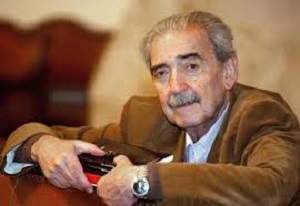
Juan Gelman (3 mei 1930 – 14 januari 2014)
De Russische schrijfster Tatjana Tolstaja werd geboren op 3 mei 1951 in Leningrad. Zie ook alle tags voor Tatjana Tolstaja op dit blog.
Uit: The Tragedy Of Tolstoy
“Then comes my turn. I pack myself into the basket with difficulty, with feet folded under. I feel awkward, suffocated, and a little scared. The basket sways softly and evenly; because it is being tilted a little, I believe that we are going downstairs. I am trying with all my might to guess the direction. The basket swings upward, there is a jolt, my head knocks against its side, and father's voice says loudly, "Well, now, guess where you are."
"In the maid's room!" I shout.
"No, you haven't guessed,"
I crawl out, stand up, and look around. What is this? For a moment it seems to me that I am in a strange place. It is half dark, there is a window and it is grated. "Papa's study!" I shout at the top of my lungs, opening the curtains which they had drawn on purpose. Nikiforych lifts me up and lets me down to the floor. "Well, little ones, that will do for today," father says. We do not pester him for more, as we would nurse or mother, but run back to our room overjoyed.
When father leaves his study a little early for dinner, he likes to play with us. He carries us in his arms, makes us turn somersaults, and bears us on his shoulders.
Presently the whole family is assembled in the dining-room; only mother is missing. the soup and the soup pastry are getting cold, but no one sits down; we wait for the lady of the house. then we hear mother's voice and the rustling of her silk skirts. "One, two, three, quick -- all under the table!" father commands. In the twinkling of an eye, sisters, brothers, guests, the English governess, all are under the table. We sit there and silently choke with laughter so that it hurts in the pit of the stomach. "But where is everybody?" mother inquires, looking wonderingly around the empty room with her shortsighted eyes. "I cannot tell,“
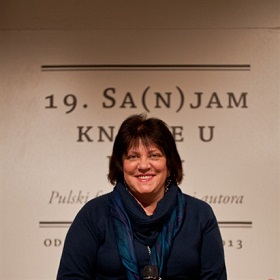
Tatjana Tolstaja (Leningrad, 3 mei 1951)
De Franse dichteres en schrijfster Agnès Desarthe werd geboren op 3 mei 1966 in Parijs. Zie ook alle tags voor Agnès Desarthe op dit blog.
Uit: Dans la nuit brune
“— À tes amours, lance Jérôme en levant son verre.
— À l’amour en général, corrige Paula. Soyons généreux. Élevons le débat. C’est quoi, d’ailleurs, l’amour.
C’est Marina et Armand. C’est Armand et Marina, pense Jérôme, mais il ne le dit pas.
— C’est quand on pense à l’autre en souriant. Quand on a tellement envie de prononcer son nom qu’on est prêt à raconter n’importe quoi pour le dire, pour l’entendre, déclare-t-il.
— Quand je t’ai vu la première fois, fait Paula, dont la diction comme à être légèrement altérée par la boisson, j’ai trouvé que tu ressemblais à Clint Eastwood. Quand je parlais de toi à mes amis, je disais Clint.
— C’est parce que tu étais amoureuse de Clint Eastwood, alors, remarque Jérôme. Sinon, tu aurais dit Jérôme.”
(…)
« Il se surprend, une fois encore, à envier le silence des animaux, leur fatalisme. Manger, être mangé, donner la vie, la perdre. Les bêtes filent, suivant une trajectoire parfaite, jamais elles n'hésitent, jamais elles ne renoncent, jamais elles ne changent d'avis. Elles ignorent les carrefours, propulsées comme des flèches par l'arbalète divine, avec pour seule mission d'accomplir une courbe parfaite, de la naissance à la mort, de fuser depuis le néant vers le néant, avec grâce et légèreté. Les destins humains, en comparaison, lui semblent si tortueux, si maladroits, lourds, corrompus."
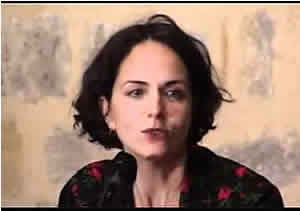
Agnès Desarthe (Parijs, 3 mei 1966)
De Franse dichter en schrijver Pierre Emmanuel (eig. Noël Mathieu) werd geboren op 3 mei 1916 in Gan (Pyrénées-Atlantiques). Zie ook alle tags voor Pierre Emmanuel op dit blog.
À Gérard Manley Hopkins
Console, ô
Mort, mon cœur sans ombre et seul, soleil profond, frappant d'aplomb la chair.
Ah ! la chère
Ombre morte, victime enfin de cette faim, ce fol ennui qui tue la
Nuit et tourne et luit et roule là !
Le gouffre et la roue rayonnante, le sang silencieux qui s'ouvre, et,
Ciel ! j'entends le sourd écho des coups qui sapent l'âme...
Oh tremble, tremble corps creusé par le sang et qui ruses, sentant sans cesse t'ébranler le bélier...
Ce bruit lourd par l'oubli engourdi, mais qui reprend, prolonge la peur, devient panique et dur, atteint l'azur, faisant crouler le jour dans le sang, et le sang
dans l'absence...
Et les tours, les tombes et les temples tombes es monts rasés, le monde las, contemple o
Mort ! la cendre d'or de l'étendue, l'encens
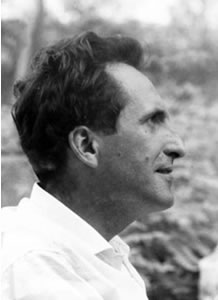
Pierre Emmanuel (3 mei 1916 – 24 september 1984)
De Duitse dichter en toneelschrijver August Friedrich Ferdinand von Kotzebue werd in Weimar geboren op 3 mei 1761. Zie ook alle tags voor August von Kotzebue op dit blog.
Uit:Die Indianer in England
“SIR JOHN. Auweh!
LIDDY. Schon wieder Schmerzen?
SIR JOHN. Nicht anders als ob ein Pulk Baschkiren in jedem Fußzeh wirtschaftete.
LIDDY. Armer Vater!
SIR JOHN. Gute Liddy!
LIDDY. Wer doch helfen könnte!
SIR JOHN. Auch dieser Wunsch ist Arznei. Du bist ja das einzige Geschöpf hier im Hause, das meinen kranken Körper pflegt, und meine kranke Seele mit einem guten Wunsche erquickt.
LIDDY. Nicht doch! –
SIR JOHN. Ja doch! ja doch! Sieh, ich gebe dir das Zeugnis vor Gott, du bist der einzige Trost meines kränklichen Alters.
LIDDY. Sie vergessen, daß Sie Söhne haben.
SIR JOHN. Söhne? Nun ja. Ich Tor murrte mit der Vorsicht, als mir vor achtzehn Jahren eine Tochter geboren wurde. Söhne wollt' ich haben, Söhne! rasche flinke Bursche! die, dacht' ich, sind leichter versorgt, helfen sich besser durch die Welt – ja, ja, sich helfen sie durch, und lassen den armen kranken Vater im Stiche. Da ist der Samuel.
LIDDY. Seine vielen Geschäfte –
SIR JOHN. Pfui! Dankbarkeit gegen Vater und Mutter soll sein das erste Geschäft eines Kindes. Samuel ist ein Schleicher; und der Robert –
LIDDY mit vieler Teilnahme. Nun der Robert, lieber Vater?“
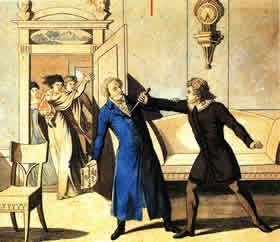
August von Kotzebue (3 mei 1761 - 23 maart 1819)
De moord op Kotzebue (afbeelding uit 1819)
De Engelse schrijfster Dodie Smith werd geboren op 3 mei 1896 in Whitefield. Zie ook alle tags voor Dodie Smith op dit blog.
Uit: The Hundred and One Dalmatians
‘It’d be quite easy,’ said Cruella. ‘I’ve drowned dozens of my cat’s kittens. She always chooses some wretched alley-cat for their father so they’re never worth keeping.
‘Surely you leave her one kitten?’ said Mrs Dearly.
‘If I’d done that, I’d be overrun with cats,’ said Cruella.
‘Are you sure those horrid little white rats are pure Dalmatian puppies?’
‘Quite sure,’ snapped Mrs Dearly. ‘Now please go away, you’re upsetting Missus.’
And indeed Missus was upset. Even with the Dearlys there to protect her and her puppies, she was a little afraid of this tall woman with black-and-white hair who stared so hard. And that poor cat who had lost all her kittens! Never, Never, would Missus forget that! (And one day she was to be glad she remembered it.)
‘How long will it be before the puppies are old enough to leave their mother?’ asked Cruella. ‘In case I want to buy some.’
‘Seven or eight weeks,’ said Mr Dearly. ‘But there won’t be any for sale.’ Then he shut the cupboard door in Cruella’s face and Nanny Butler firmly showed her out of the house."
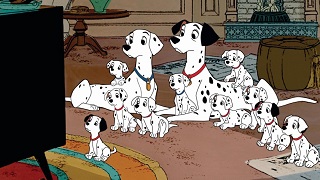
Dodie Smith (3 mei 1896 – 24 november 1990)
Scene uit de Disney-film uit 1961
De Braziliaanse schrijfster Nélida Piñon werd geboren op 3 mei 1937 in Rio de Janeiro als dochter van Spaanse immigranten. Zie ook alle tags voor Nélida Piñon op dit blog.
Uit: I Love My Husband (Vertaald door Elzbieta Szoka)
“I love my husband. From morning to night. I make him coflee first thing in the morning. He always sleeps poorly and lets out an exhausted sigh as he begins to shave. I knock three times on the bathroom door. before the coffee gets cold. He growls angrily at me while I let out an anxious yell. I don't want him to confuse my elTort with the cold liquid that he will gulp down the same way he consumes me twice a week, especially on Saturdays.
I then adjust his tie, him protesting because I only take care of the smallest part of his life. I laugh to calm him down. so that he can go out and face life in the outside world. And always bring deliciously fresh bread to our home.
He says that I am too demanding. 1 stay at home washing the dishes and going to the store. And complaining about life. Meanwhile he builds his world of little bricks. and although some of his walls fall down in the end. his friends congratulate him for such solid and visible creation.
They also acknowledge me for taking care of a man who dreams big and makes the country fair and prosperous in his peculiar and grandiose way. And that's why I'm just a shadow of a man that everyone says I love. I let sunshine into the house, gilding the objects that we worked so hard to buy. I do this even though he doesn't show me any gratitude for these shining objects. On the contrary. sure of my love for him. he proclaims that all i do is to spend the money that he sweats so hard for. I ask him to understand my nostalgia for a land that. in the old days. was cultivated by women. But he just frowns as if I were offering a theory that will shame our family and the binding rules of our home.”
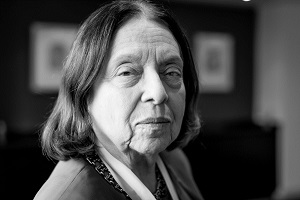
Nélida Piñon (Rio de Janeiro, 3 mei 1937)
De Duitse schrijver Soma Morgenstern (eig. Salomo) werd geboren op 3 mei 1890 in Budzanów in Oostgalicië. Zie ook alle tags voor Soma Morgenstern op dit blog.
Uit: Der Tod ist ein Flop
„Er sah eine Reihe strohgedeckter Bauernhütten hinterm Teich, und überm Wasser ein Stück Himmel, der noch grau war, grau, tief und still. Die große Stille, die ihm in den ersten Tagen in den Ohren klang, hörte Alfred nicht mehr, er sah sie nur noch staunend mit den Augen. Hier ist ein anderer Himmel; nicht sehr hoch, nicht sehr fern: unter diesem Himmel könnte noch die Eintracht aller Dinge gedeihen."
(…)
"Ich wollte Ihren Freund Csanda von seiner Arbeit an dem Buch, das er das 'Totenbuch' genannt hat, abbringen." - "Glauben Sie, daß er sich so was gefallen läßt?" - "Darüber wird Ihnen Ihr Freund Csanda Auskunft geben." - "Hat Ihnen der Titel Totenbuch nicht gefallen?" "Es hat mir nicht behagt, daß er sich mit dem Tod einläßt." - "Warum? Es ist kein so unwichtiges Thema, scheint mir." - "Unwichtig ist es sicher nicht. Aber es ist kein Thema für Csanda. Das Motiv, das ihn zu diesem Buch getrieben hat, war mir verdächtig. Er hat sich jahrelang Vorwürfe gemacht, daß er eine wichtige Episode in seinem Leben nicht verleugnet hat. Mit diesem Buch wollte er es abbüßen. So kommt kein gutes Werk zustande. Abgesehen davon: der Tod ist ein gefährliches Thema. [...] Der Tod ist ein Flop."
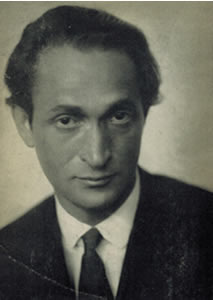
Soma Morgenstern (3 mei 1890 – 17 april 1976)
|



